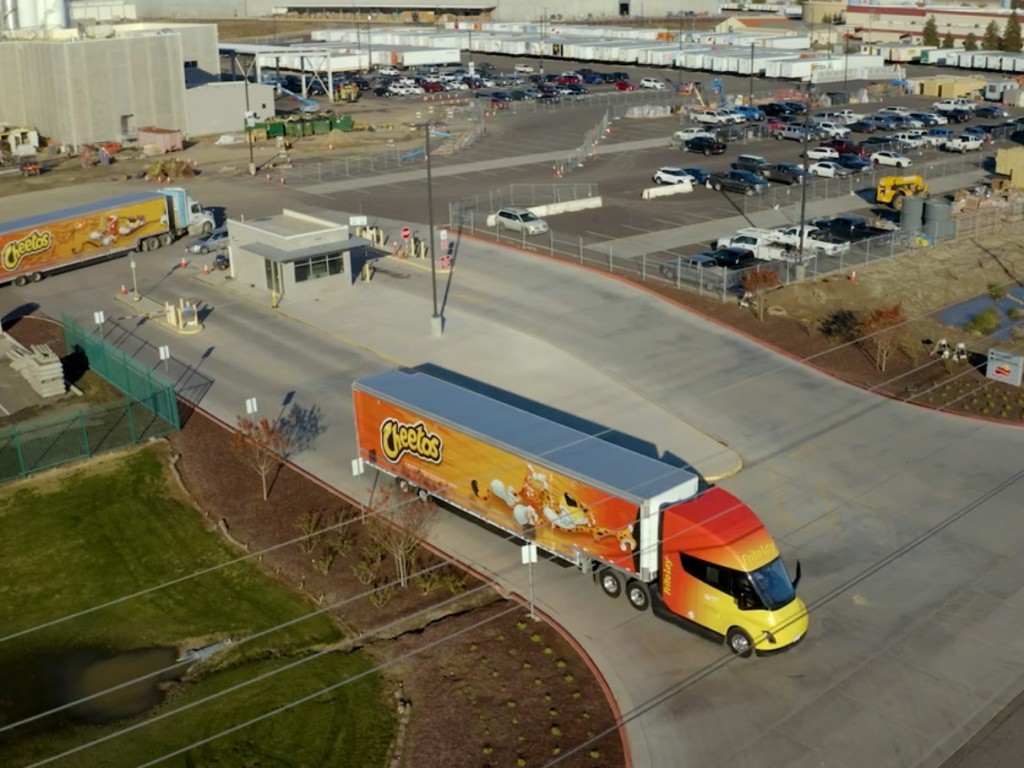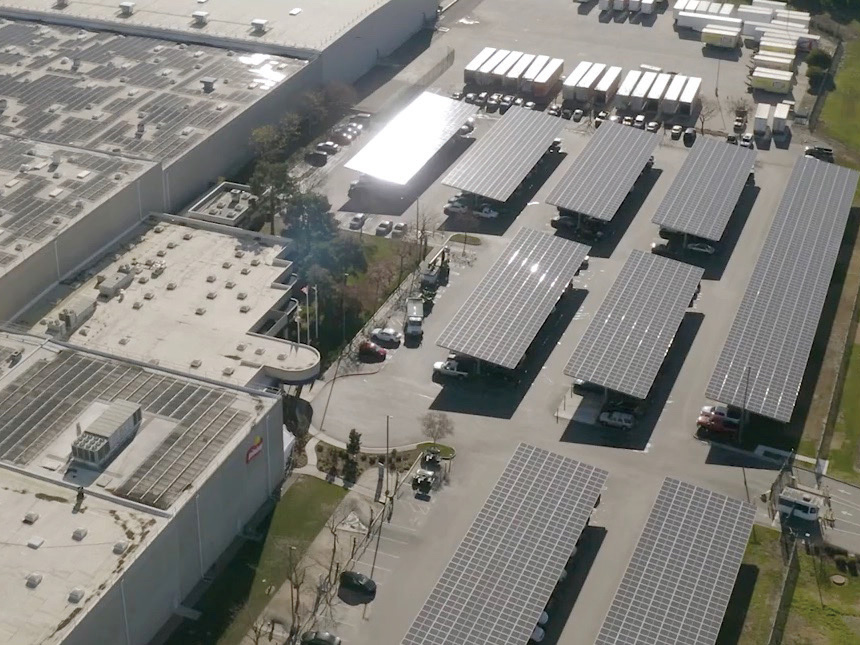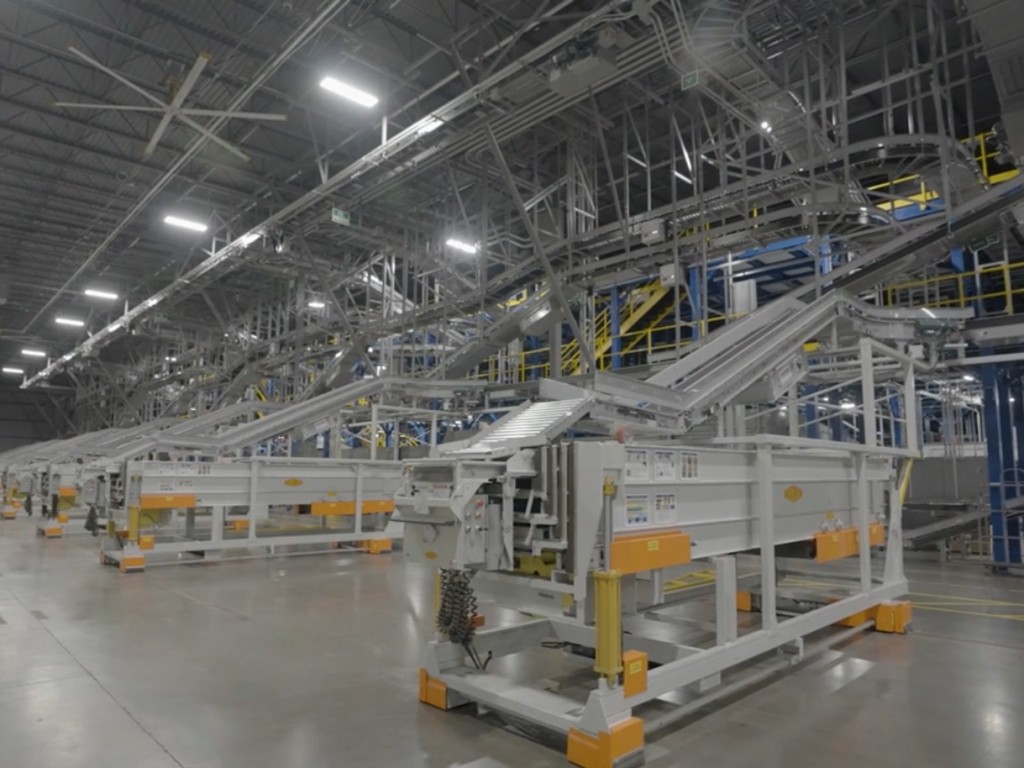By replacing diesel yard vehicles, forklifts, and delivery trucks with green alternatives, the snack food giant slashed emissions by 91% in Modesto.

According to studies undertaken by the World Economic Forum, the freight logistics sector globally is responsible for 5.5% of worldwide greenhouse gas emissions. Of those, logistics sites, such as warehouses, distribution centers, and cross-dock facilities, contribute 13% of the freight sector’s total emissions—equivalent to the air cargo and rail freight sectors’ emissions combined. In the United States, the proportion for logistics sites is likely higher; some studies estimate that they are responsible for as much as 25% of all freight sector emissions.
Frito-Lay North America, the $19 billion snack foods division of PepsiCo, Inc., set out to do something about that beginning in 2019, when it started to acquire electric yard trucks for distribution operations at its manufacturing and warehousing facility in Modesto, California. By 2021, the company had replaced all diesel-powered vehicles at the 80-acre campus with zero emissions or near zero emissions alternatives. Fast forward to 2023, and the company has succeeded in cutting greenhouse gas emissions from fleet operations at the facility by over 90%.

Frito-Lay Modesto Scores 91% Reduction in Greenhouse Gases
The Frito-Lay Modesto site is one of the largest of the company’s facilities in the U.S., with half a million square feet and 1,100 employees. “To date, the Frito-Lay Modesto transformation has resulted in a 91% reduction, or 5,250 metric tons, in greenhouse gas emissions from direct fleet operations,” said Steven Williams, CEO of PepsiCo Foods North America. That’s the equivalent of removing over 1,000 compact SUVs from the road. Williams estimates that the change in fleet composition slashed greenhouse gas pollution for the plant operations as a whole by 53%.
The transformation at Modesto “can help accelerate the proliferation of large-scale commercialization of zero-emission and near zero-emission technologies at freight facilities and warehouses,” Williams added, “magnifying emissions reduction benefits on a broad scale.” PepsiCo has a corporate goal of reducing its greenhouse gas emissions by 40% by 2030 and to achieve net-zero emissions by 2040.
Besides replacing the diesel powered fleet with greener alternatives, the upgrades at the Modesto facility also included installing a charging infrastructure for the new fleet as well as facilities for on-site renewable energy generation and storage. The Modesto site achieved 100% sourcing of its electricity from renewable sources in 2021, through a combination of renewable electricity certificates—tradeable instruments which indicate that electricity generated from renewable energy resources was fed into the shared system of power lines—and on-site generation, in the form of solar power, which currently provides 20% of the Modesto facility’s daily energy use. The company has also deployed seven dual-head employee electric vehicle charging stations capable of charging up to 14 vehicles at one time.
“We are using Modesto as our proof of concept,” said Steve Hanson, senior director of fleet operations, engineering, and sustainability for Frito-Lay. “It is showing us how we put this all together and make it robust and reliable so it can meet the needs of the business.”

In the Beginning: BYD Electric Yard Tractors
The story begins in 2019, when Frito-Lay acquired three BYD (Build Your Dreams) 8Y electric yard tractors. Each yard tractor operates 20 hours per day and moves over 150 trailers while requiring charging for only two hours a day.
BYD, headquartered in Shenzhen, China, was founded as a battery company in 1995, and also manufactures lines of electric cars, buses, forklifts, and rail systems. The company’s North American division is headquartered in Los Angeles, and it operates a manufacturing facility in Lancaster, California.
BYD’s vehicles are powered by the company’s proprietary ECC32 iron-phosphate technology, which uses a battery chemistry that is nontoxic, and, according to the company, provides the industry’s longest lasting battery power source. Last year, BYD introduced a 7,000-pound electric forklift powered by ECC32 technology.
Besides replacing its diesel yard tractors with the BYD trucks, Frito-Lay replaced all of the diesel vehicles at the Modesto site. It now uses 12 Crown lithium-ion electric forklifts in the warehouse and on the docks and six 220EV Peterbilt electric box trucks for distributing products to local retailers. A fleet of 38 Volvo VNL compressed natural gas tractors handles larger local and regional shipments, and, earlier this year, Frito-Lay took delivery of 15 electric Tesla Semi rigs, also for regional hauling. Four Tesla 750kW charging stations provide the semis with 400 miles of range after one hour of charging.
Many companies are now testing electric vehicles, but Frito-Lay’s changes at the Modesto facility go farther than most and represent a model for companies looking to remove carbon emissions from their supply chains, according to a report from Calstart, a Pasadena-based nonprofit organization focusing on the clean transportation industry, and which provided consulting for the Frito-Lay project.
The Modesto project, said the report, “provides a tested example of successful heavy-duty vehicle deployments, carrying out operations that diesel vehicles once performed now with no emissions, significantly lower fuel costs, and improved worker conditions.”
In addition to the changes in vehicle fleets, Frito-Lay, in order to achieve lower emissions across the Modesto facility, also had to consider how to include backup power for its production plant and how to use electric infrastructure to support the charging needs for forklifts, yard tractors, medium-duty delivery trucks, and Class 8 vehicles. The company installed a one-megawatt solar carport with energy storage, which doubles the amount of solar generation capacity at the facility by supplementing the site’s one-megawatt of rooftop solar panels. The facility also has 2.7 megawatt-hours of on-site battery storage to help reduce the site’s electricity costs and support grid capacity by reducing the facility’s electricity load on the grid during peak times.
California Climate Investment Initiative
The Frito-Lay Modesto project was supported by the California Climate Investments initiative in conjunction with the San Joaquin Valley Air Pollution Control District, and the California Air Resources Board (CARB), which provided grants totaling $15.4 million to cover a portion of the Frito-Lay transformation.
“CARB’s approach to fighting local air pollution is to work with industry and other partners on projects that demonstrate how a fleet can protect public health by shifting to clean vehicle technologies and equipment,” said Steven Cliff, CARB’s executive officer.
“The transformation of the Frito-Lay facility in Modesto is a notable example of this approach.”

Follow us on social media: